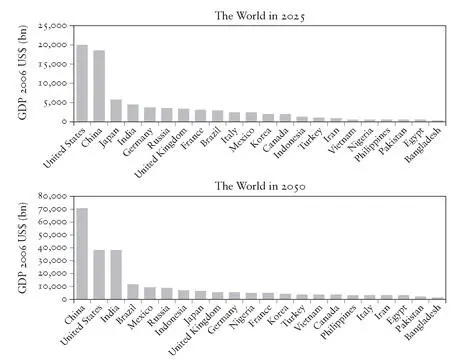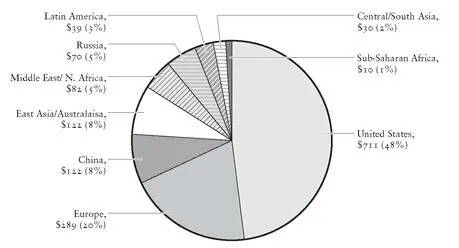According to projections by Goldman Sachs, as shown in Figure 1, the three largest economies in the world by 2050 will be China, followed by a closely matched America and India some way behind, and then Brazil, Mexico, Russia and Indonesia. [6] [6] Dominic Wilson and Anna Stupnytska, ‘The N-11: More Than an Acronym’, Goldman Sachs Global Economics Papers , 153, 28 March 2007, pp. 8–9.
Only two European countries feature in the top ten, namely the UK and Germany in ninth and tenth place respectively. Of the present G7, only four appear in the top ten. In similar forecasts, PricewaterhouseCoopers suggest that the Brazilian economy could be larger than Japan’s, and that the Russian, Mexican and Indonesian economies could each be bigger than the German, French and UK economies by 2050. [7] [7] John Hawksworth and Gordon Cookson, ‘The World in 2050 — Beyond the BRICs: A Broader Look at Emerging Market Growth Prospects’, PricewaterhouseCoopers, March 2008, p. 3.
If these projections, or something similar, are borne out in practice, then during the next four decades the world will come to look like a very different place indeed.

Figure 1. Projected size of national economies.
Such a scenario was far from people’s minds in 2001. Following 9/11, the United States not only saw itself as the sole superpower but attempted to establish a new global role which reflected that pre-eminence. The neo-conservative think-tank Project for the New American Century, established in 1997 by, amongst others, Dick Cheney, Donald Rumsfeld and Paul Wolfowitz, adopted a statement of principles which articulated the new doctrine and helped prepare the ground for the Bush administration:
As the 20th century draws to a close, the United States stands as the world’s pre-eminent power. Having led the West to victory in the Cold War, America faces an opportunity and a challenge: Does the United States have the vision to build upon the achievements of past decades? Does the United States have the resolve to shape a new century favorable to American principles and interests? [8] [8] www.newamericancentury.org/statementofprinciples.htm.
In 2004 the influential neo-conservative Charles Krauthammer wrote:
On December 26, 1991, the Soviet Union died and something new was born, something utterly new — a unipolar world dominated by a single superpower unchecked by any rival and with decisive reach in every corner of the globe. This is a staggering development in history, not seen since the fall of Rome. [9] [9] Charles Krauthammer, ‘An American Foreign Policy for a Unipolar World’, Irving Kristol Lecture, American Enterprise Institute Dinner, 10 February 2004.
The new century dawned with the world deeply aware of and preoccupied by the prospect of what appeared to be overwhelming American power. The neo-conservatives chose to interpret the world through the prism of the defeat of the Soviet Union and the overwhelming military superiority enjoyed by the United States, rather than in terms of the underlying trend towards economic multipolarity, which was downplayed. The new doctrine placed a premium on the importance of the United States maintaining a huge military lead over other countries in order to deter potential rivals, and on the US pursuing its own interests rather than being constrained either by its allies or international agreements. [10] [10] Philippe Sands, Lawless World: America and the Making and Breaking of Global Rules (London: Allen Lane, 2005), Chapters 3–4, 10.
In the post-Cold War era, US military expenditure was almost as great as that of all the other nations of the world combined: never in the history of the human race has the military inequality between one nation and all others been so great. [11] [11] www.globalissues.org/Geopolitics/ArmsTrade/Spending.asp#InContextUSMilitary. SpendingVersusRestoftheWorld.
The Bush presidency’s foreign policy marked an important shift compared with that of previous administrations: the war on terror became the new imperative, America ’s relations with Western Europe were accorded reduced significance, the principle of national sovereignty was denigrated and that of regime-change affirmed, [12] [12] The argument against the inviolability of national sovereignty, of course, has various rationales, notably failed states and so-called rogue states. Robert Cooper, The Breaking of Nations: Order and Chaos in the Twenty-first Century (London: Atlantic Books, 2003), and ‘Civilise or Die’, Guardian , 23 October 2003; Michael Ignatieff, Empire Lite: Nation-Building in Bosnia, Kosovo and Afghanistan (London: Vintage, 2003). Ignatieff quite wrongly suggests (p. 21) that ‘we are living through the collapse into disorder of many [my italics] of these former colonial states’ in Asia and Africa.
culminating in the invasion of Iraq. Far from the United States presiding over a reshaping of global affairs, however, it rapidly found itself beleaguered in Iraq and enjoying less global support than at any time since 1945. [13] [13] G. John Ikenberry, Liberal Order and Imperial Ambition: Essays on American Power and World Politics (Cambridge: Polity, 2006), p. 12.
The exercise of overwhelming military power proved of little effect in Iraq but served to squander the reserves of soft power — in Joseph S. Nye’s words, ‘the attractiveness of a country’s culture, political ideals and policies’ [14] [14] Joseph S. Nye Jr, Soft Power: The Means to Success in World Politics (New York: Public Affairs, 2004), p. x.
— that the United States had accumulated since 1945. [15] [15] Joshua Kurlantzick, Charm Offensive: How China’s Soft Power is Transforming the World (New Haven and London: Yale University Press, 2007), Chapter 9.
Failing to comprehend the significance of deeper economic trends, as well as misreading the situation in Iraq, the Bush administration overestimated American power and thereby overplayed its hand, with the consequence that its policies had exactly the opposite effect to that which had been intended: instead of enhancing the US’s position in the world, Bush’s foreign policy seriously weakened it. The neo-conservative position represented a catastrophic misreading of history.

Figure 2. Global distribution of military expenditure in 2008 (billions of U.S. dollars).
Military and political power rest on economic strength. As Paul Kennedy argued in The Rise and Fall of the Great Powers, the ability of nations to exercise and sustain global hegemony has ultimately depended on their productive capacity. [16] [16] Paul Kennedy, The Rise and Fall of the Great Powers: Economic Change and Military Conflict from 1500 to 2000 (London: Fontana Press, 1988), for example pp. 472-80, 665-92.
America’s present superpower status is a product of its rapid economic growth between 1870 and 1950 and the fact that during the second half of the twentieth century it was the world’s largest and often most dynamic economy. This economic strength underpinned and made possible its astonishing political, cultural and military power from 1945 onwards. According to the economic historian Angus Maddison, the US economy accounted for 8.8 per cent of global GDP in 1870. There then followed a spectacular period of growth during which the proportion rose to 18.9 per cent in 1913 and 27.3 per cent in 1950. This was followed by a slow and steady decline to 22.1 per cent in 1973, with the figure now hovering around 20 per cent. [17] [17] Angus Maddison, The World Economy: Historical Statistics (Paris: OECD, 2003), p. 261.
This still represents a formidable proportion, given that the US accounts for only 4.6 per cent of the world’s population, but the long-run trend is unmistakable. [18] [18] Ibid., p. 258.
One could make a similar point in relation to Victorian Britain’s imperial reach between 1850 and 1914. This was made possible because Britain accomplished the world’s first industrial revolution and, as a consequence, came to enjoy a big economic lead over all other countries. Compared with the United States, however, whose share of global GDP peaked at 35 per cent in 1944 (albeit in a war-ravaged world), the highest figure for the UK was a much smaller 9 per cent in 1899. The precipitous decline of Britain as a global power over the last half century has been the predictable result of its deteriorating relative economic position, its share of global GDP having sunk to a mere 3.3 per cent by 1998. [19] [19] See Christopher Chase-Dunn, Rebecca Giem, Andrew Jorgenson, Thomas Reifer, John Rogers and Shoon Lio, ‘The Trajectory of the United States in the World System: A Quantitative Reflection’, IROWS Working Paper No. 8, University of California. A dramatic and early illustration of the effects of the UK’s imperial decline was the rapid loss of British Asia between 1941 and 1945; Christopher Bayly and Tim Harper, Forgotten Armies: The Fall of British Asia, 1941 - 1945 (London: Allen Lane, 2004).
If Britain took its place alongside the United States in Iraq, its military contribution was largely cosmetic. The precondition for being a hegemonic power, including the ability or otherwise to preside over a formal or informal empire, is economic strength. In the long run at least, it is a merciless measure. Notwithstanding this, imperial powers in decline are almost invariably in denial of the fact. That was the case with Britain from 1918 onwards and, to judge by the behaviour of the Bush administration (though perhaps not Obama’s) — which failed to read the runes, preferring to believe that the US was about to rule the world in a new American century when the country was actually in decline and on the eve of a world in which it would find its authority considerably diminished — the US may well make the same mistake, perhaps on a much grander scale. The financial meltdown in 2008 belatedly persuaded a growing number of American commentators that the United States might after all be in decline, but that was still a far cry from a general recognition of the extent and irreversibility of that decline and how it might diminish American power and influence in the future.
Читать дальше














